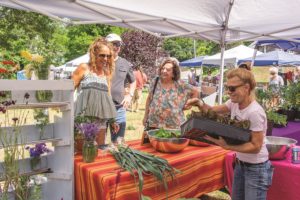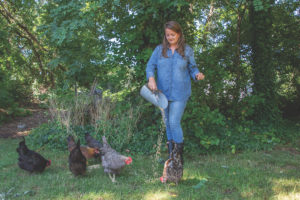TRURO — When the pandemic hit and restaurants closed, Uli Winslow, a mushroom farmer in Truro, expected his sales to take a nosedive, and for good reason: about half of his business was selling to restaurants on the Outer Cape, and they were closing left and right.
But, to his surprise, his sales held steady — thanks to the local farmers markets, his other main source of business. Winslow sells mushrooms at the markets in Truro, Wellfleet, and Orleans.
During last year’s pandemic summer, farmers markets were among the few local businesses that thrived. So far this summer, demand seems to be even higher, leaving farmers and organizers wondering if they can keep up.
Alyssa Staker, the Wellfleet Farmers Market manager, said she saw a rise in visitors and vendor sales last summer. It was one of their best years ever. The Truro and Provincetown farmers markets, which are both run by the nonprofit Sustainable CAPE, experienced similarly strong seasons, according to Founding Director Francie Randolph.
Sales at the Brewster Historical Society farmers market tripled, according to Sadie Hill, who manages the market and is working to establish one in Eastham.
Market organizers are now trying to assess what made it possible for them to succeed in a season when nearly all aspects of the Outer Cape’s economy were depressed, and hoping to use what they learn to plan for the future.
Early in the pandemic, the markets had an immediate advantage over traditional stores simply because they operate outdoors, where risk of contracting Covid-19 had been shown to be much lower — even nonexistent. Staker said people just felt more comfortable at the farmers market than at big indoor grocery stores.
The pandemic also made consumers aware of the fragility of national supply chains, and that brought new attention to locally sourced food.

“When you can’t get toilet paper, the next thing you think you’re not going to get is your tomato,” said Stephanie Rein, who runs Out There Organics in Truro and sells at the town’s farmers market.
Still, the farmers markets had to make changes to stay operational during the pandemic. In addition to PPE, distancing, and cleaning measures, Sustainable CAPE markets added a system that allowed buyers to order and pay ahead of time, Randolph said. Sustainable CAPE also became a Mass. Healthy Incentive Program vendor, which allows SNAP recipients to buy more from participating farmers markets. (Now markets in Provincetown, Truro, and Wellfleet all have HIP certification).
The online ordering and HIP certifications are here to stay, according to Randolph.
The Brewster market switched to delivery services, bringing food boxes to people’s homes, said Hill. Farmers did “exceptionally well,” she added, because they knew exactly how much to produce each week, which reduced waste. Brewster is back to a regular in-person market, but Hill said she’d like to bring what she learned about using a delivery service to Eastham when a market is up and running there.
Enthusiasm for local produce that emerged during the pandemic seems to have carried to the new season, at least according to early indicators. Randolph said on the first day the Truro farmers market was open, which was June 14, sales were triple what they had been in previous years.
Can Sustainable CAPE’s vendors keep up with the high demand? “We hope so,” Randolph said.
“I’m kicking butt at the farmers markets,” said Drew Locke, who owns and operates Hillside Poultry Farm in Truro and sells his product at the Orleans market. Part of his success has been driven by customers buying more than before — some regulars who used to purchase a single chicken are now buying two or three per visit, he said.
But, Locke said, it’s hard to react to rising demand in real time. His chickens take about eight weeks to mature — if he wants to raise more to respond to a hot market, he won’t be able to sell them until two months later.
There are other limiting factors, too: production, killing and cleaning the birds, is a bottleneck, and Locke said he has had trouble finding workers to lighten the load. On top of that, Locke has a family to take care of — days before Father’s Day he had to skip production because of the birth of his son.
“I’m not getting much sleep,” he said. “But people are still asking me, ‘Where are the chickens? Where are the chickens?’ ”
Demand this season, said Uli Winslow, has been “more than I can keep up with.” As a result, he has hired someone to sell his mushrooms at the farmers markets, at least some of the time, so that he can have more time for tending to production. Given the labor shortages in the service industries, Winslow feels lucky to have found any extra help.
Rein said her sales have doubled so far this year. She anticipated a big season, so she planted more. She also tried to be strategic — planting crops she doesn’t think others will be selling at the market, such as purple peppers and yellow cucumbers.
Randolph knows growth is not easy for small producers, but she’s optimistic about it. After all, she said, farmers markets are “business incubators” — each dollar spent there reverberates through the local economy.

